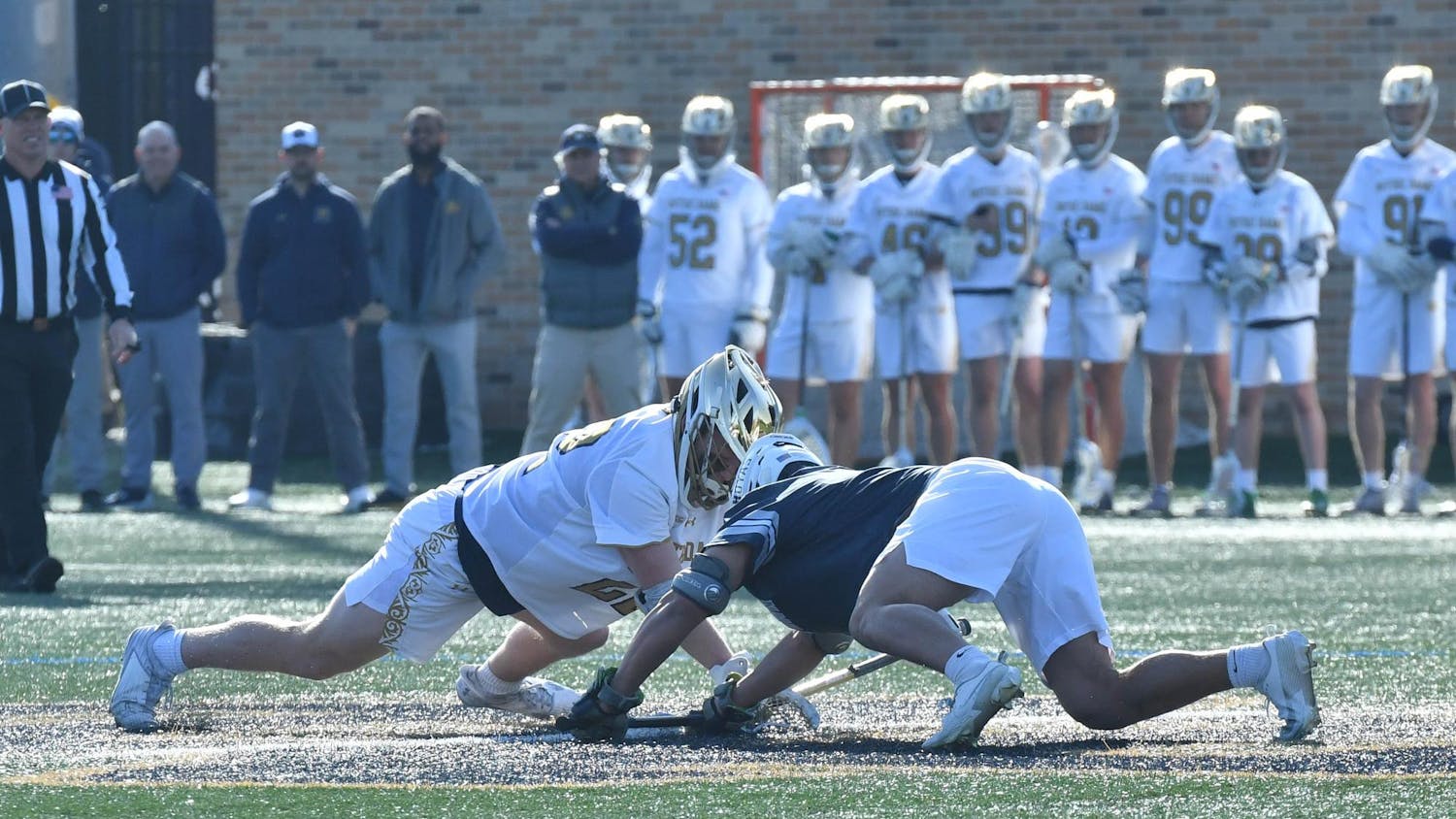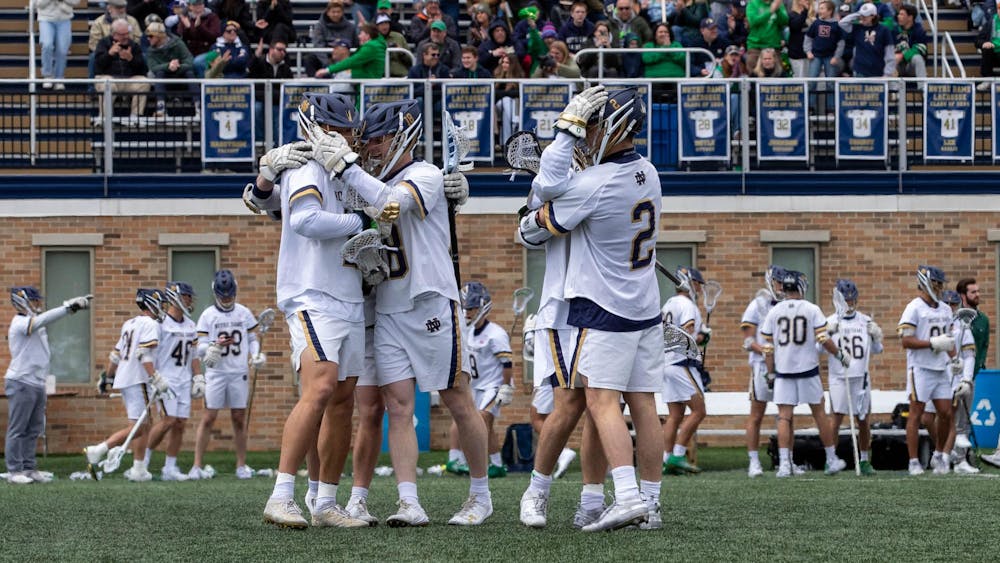DUBLIN - The Fighting Irish in Ireland.
It is a rare occasion that Notre Dame is able to celebrate its athletic identity in Ireland. Most assume the iconic moniker has always represented the program, but in reality that identity was not made official until 1927, according to University archives.

Earlier in its history, Notre Dame would compete athletically against local colleges, with press reports referring to teams by the school's religion. Although the entire roster was not composed of Catholic players or men of Irish descent, the team was typically referred to as the Catholics or the Irish.
Despite others using the nickname as a slur, Notre Dame embraced it. After all, it served as a reminder of the school's heritage: more than a name or a people - a faith. It became a symbol for anyone discriminated against and represented the core values of the Catholic institution.
Logistics of the trip
Notre Dame and Navy are hardly strangers - this is the 86th consecutive year the schools have played, 13 years longer than the University has carried the 'Fighting Irish' nickname - but Saturday's season opener will carry unfamiliar, though not unprecedented, flair.
The festivities surrounding the Emerald Isle Classic will become cherished memories for the estimated 35,000 Americans traveling to Dublin for a football game. For those involved in the competition, the logistics are simply a nightmare.
"It is incredibly challenging," Notre Dame Director of Athletics Jack Swarbrick said. "Not every 18-year-old has a passport, so you start with basic things like that. You have to get everybody a passport, plus the customs issues. That's one logistical example of it and it's everything about the sleep cycle of the team and the dietary needs."

Two-year-old Aviva Stadium, the site of Saturday's contest, hosts an Irish rugby team and Ireland's national soccer squad. The facility underwent a makeover in recent weeks to house American football, but some aspects of the stadium simply cannot be modified.
Notre Dame director of football operations Chad Klunder and equipment manager Ryan Grooms traveled to the stadium in May to make preparations for Saturday's game. One of the challenges: Notre Dame's locker room in Ireland contains 28 lockers, but roughly 100 players are traveling with the team. As a solution, the Irish offense will double up each locker while the defense uses an auxiliary room adjacent to the locker room.
"It's a very complicated deal, and I couldn't be prouder of our staff for pulling it off," said Swarbrick, who added that several truckloads of equipment would be hauled from Aviva Stadium to Dublin International Airport throughout the game to get a head start on passing through customs.
Irish coach Brian Kelly said his primary concern is how the trip - and the quick turnaround - affects the players later in September.
"What I'm worried about is sleep, loss of sleep, and a cumulative fatigue factor that bites us three, four weeks down the road," said Kelly, whose team faces Michigan State and Michigan in weeks three and four, respectively, before a bye week. "So my concerns are more in not just one game but three or four weeks.
"I love everything about Ireland. I'm not a big fan of playing football games in Ireland."
Senior captain MantiTe'o said the players need to keep each other in check and keep the trip in perspective: They have a job to accomplish, not a vacation to enjoy.
"For me, it's strictly business," he said. "I'll enjoy Ireland while I can, but I'm focusing on the game.
"I'm not going to say it won't be a distraction. It's definitely going to be a distraction."
An international affair
Sixteen years ago, Notre Dame played in Ireland for the first time (and made its second international appearance in program history) when it defeated Navy 54-27 in Dublin.
The field was soggy, the two sides had to share a sideline and played in front of 38,651 fans at cavernous Croke Park, a stadium with a capacity of 70,000.
Despite the problems and a midseason trip across the ocean, then-Irish coach Lou Holtz said he would jump at the opportunity to do it all over again.
"This was a great trip - I would definitely do it again," Holtz told The Observer in 1996. "I thought the game would be different [because of the environment], but it wasn't."
Whereas Kelly views the weekend as a business trip, Holtz saw it as a learning experience. He led the team on a trip to a monastery and a lecture at Trinity College and had players keep a journal of the trip as a way to remember the weekend.
As a sign of the times, the 1996 game - played at 8 a.m. EST - was tape-delayed by CBS until noon. With the majority of the TV timeouts eliminated from the broadcast, the game concluded in less than three hours.
"I enjoy playing the game on TV, but liked it without the TV timeouts," Holtz said. "If PBS is interested in televising our games, I think it would be tremendous."
Much like the Emerald Isle Classic, the 1996 Shamrock Classic was regarded at the time as the biggest tourist event in Dublin history, with an estimated $25 million pumped into the Irish economy.
As in 1996, the student body will be largely absent from the festivities on the other side of the Atlantic in 2012. With the price tag of a trip to Dublin a hefty one and no interruption from the academic schedule, most students will watch the game in the early morning from the comfort of their residence halls and off-campus apartments and houses.
But when the group of fans that does travel abroad packs up and heads home Sunday, the trip will become a memory, a treasured link to the past and a reminder of some of the University's fundamental roots an ocean away.












